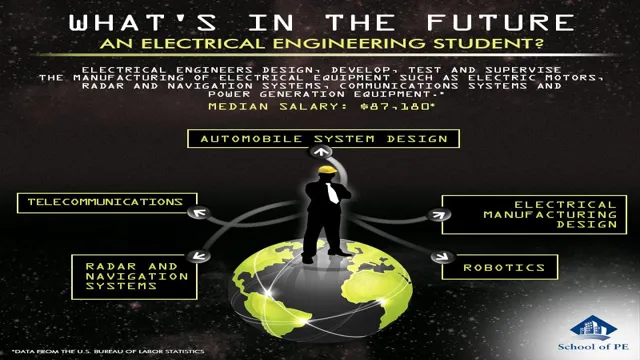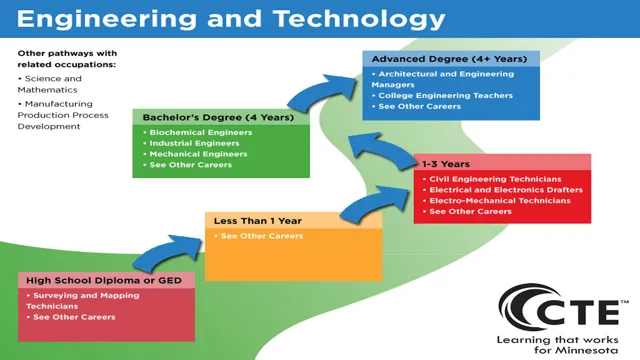Shocking Opportunities Ahead: The Ultimate Career Path for Electrical Engineering Technology
If you’re a problem-solver who enjoys analyzing and designing complex electrical systems, then a career in Electrical Engineering Tech could be the perfect fit for you. Electrical Engineering Tech is the intersection of electrical power systems, electronics, and control systems, making it an exciting and diverse field. From microprocessors to power distribution, Electrical Engineering Tech touches every aspect of our modern lives from cell phones to power grids.
In this fast-evolving field, a career in Electrical Engineering Tech can offer a variety of opportunities and career paths. Whether you’re interested in designing circuits, testing and evaluating electrical systems, or working on large-scale projects, Electrical Engineering Tech has it all. Let’s explore the various career paths you can take in Electrical Engineering Tech and discover which one suits you best.
Overview of EE Tech Career Path
If you’re considering a career path in electrical engineering technology, there are various options to consider. This field combines engineering skills with practical applications in the creation and optimization of electrical systems and equipment. As you progress in your career, you may work on designing and testing new systems, troubleshooting issues, or managing projects and teams.
Depending on your interests and strengths, you could specialize in areas such as power distribution, renewable energy, automation and control systems, or communications. To embark on this career path, you’ll typically need a degree in electrical engineering technology or a related field, as well as practical experience gained through internships or entry-level jobs. With the right skills and qualifications, you can look forward to a stable and fulfilling career in this ever-evolving field.
So, are you ready to take on the challenge?
Skills Required for Electronics Engineering Technologist
If you’re considering a career as an Electronics Engineering Technologist, you’ll need a diverse set of skills to succeed. This career path involves a mixture of hands-on work and technical analysis, so you’ll need to be comfortable with both. Some important skills include proficiency in math and science, strong problem-solving abilities, and an understanding of electrical theory.
Additionally, you’ll need to have good communication skills, as you’ll be working with other engineers and technicians to troubleshoot and solve problems. Finally, you’ll need to be comfortable with technology, as this is a field that is constantly evolving. Overall, becoming an Electronics Engineering Technologist requires a diverse skillset and a passion for technology and problem-solving.

Job Options: From Entry Level to Senior Engineer
Electrical engineering is a field that provides numerous job opportunities, from entry-level positions to senior engineer roles. As an entry-level electrical engineer, you can expect to work on various tasks such as circuit design, testing, and troubleshooting under the guidance of senior engineers. With time and experience, you can progress to a mid-level electrical engineer, where you get involved in complex designs and projects and start managing junior staff.
If you continue to develop your skills and gain more experience, you can advance to a senior-level electrical engineer, where you will oversee large projects, mentor younger engineers, and have the final say on all technical decisions. As an electrical engineer, you can also specialize in different areas, such as power systems, communications, and automation systems, to name a few. In conclusion, electrical engineering is a vast field that can provide countless job opportunities, and with hard work, dedication, and experience, you can progress to senior-level positions and become a leader in the industry.
Certifications and Licensing for EE Techs
If you’re considering a career path for electrical engineering technology, knowing about the various certifications and licensing requirements can help you achieve your goals. Many employers require EE techs to earn a certification or license before hiring them. One common certification is the Certified Electrical Technician (CET) certification, which tests candidates on their knowledge of electrical fundamentals, safety, and tools and equipment.
Another popular certification is the National Institute for Certification in Engineering Technologies’ (NICET) Electrical and Electronic Systems Technology certification, which assesses professionals’ knowledge of electronics, electrical systems, and wiring. Additionally, some states require electrical engineers to obtain a license to practice, which typically involves passing an exam and meeting education and experience requirements. By obtaining relevant certifications and licenses, you’ll stand out to potential employers and demonstrate your knowledge and commitment to the field.
With the proper education and certifications, a career path in electrical engineering technology can be lucrative and fulfilling.
Why Certification Matters
Certification for EE technicians is an important factor to consider when choosing an electrical services provider. Certification shows that the technician has undergone rigorous training and has acquired skills and knowledge necessary to provide quality electrical services. Licensing, on the other hand, ensures that the technician is legally allowed to provide these services in the area.
Both certification and licensing guarantee the safety of the technician, the client, and the property being serviced. It also minimizes the risk of electrical malfunction. Additionally, certification can help technicians specialize in a particular area such as renewable energy or information technology.
When hiring an electrical services provider, it is important to consider if they are certified and licensed. This way, you can be confident that you are working with qualified professionals who will provide the best possible service, ensuring the safety and satisfaction of all parties involved.
Different Certifications for Electrical Engineering Technicians
Electrical Engineering Technicians If you’re an electrical engineering technician, you may be wondering what certifications and licenses you need to advance your career. One popular certification is the National Institute for Certification in Engineering Technologies (NICET), which offers various levels of certification based on your experience and education. Another certification option is the Certified Electrical Engineering Technician (CEET) offered by the American Society of Certified Engineering Technicians (ASCET).
This certification requires passing an exam and having a certain amount of experience or education in the electrical engineering field. Licensed Electrical Technicians (LET) are also required in certain states, which involves passing an electrical exam and meeting state-specific requirements. It’s important to research and understand the requirements for your specific state and industry in order to achieve the proper certifications and licensing for your career as an electrical engineering technician.
Licensing Process for EE Techs
As an electrical engineer, you might have to go through certification and licensing processes to demonstrate your competency and expertise in your field. These processes vary depending on your location, but in general, you will need to pass an exam and complete specific educational requirements. So, why do you need certification and licensing? For one, it can help you stand out from other candidates when applying for jobs in the industry.
Additionally, it shows potential employers and clients that you have the skills and knowledge required to handle complex electrical engineering tasks safely and efficiently. Ultimately, certification and licensing provide opportunities for advancement and career growth, while also ensuring the safety of the public and employers. Make sure to research the specific requirements for your location and start preparing for the certification and licensing exams today.
With the proper qualifications and credentials, you can take your electrical engineering career to the next level!
Building Your EE Tech Career
As an electrical engineering technician, you have a wide range of opportunities to build a career path that fits your skills and interests. With the increasing demand for technology in various industries, the field of electrical engineering technology is continually evolving and expanding. As you embark on your career journey, it is important to take advantage of learning opportunities to stay up-to-date with the latest trends and technologies.
You can carve out a path in fields such as power system operations, control engineering, robotics, or telecommunications. One of the appealing aspects of the profession is the potential for career advancement and upward mobility, including opportunities to become supervisors and managers. Whether you choose to work in private industry, government, or academia, there is ample opportunity to gain experience and insights that inform the industry’s innovation and growth.
With your passion for the field and strong skillset, you can chart a successful career path for yourself in the exciting world of electrical engineering technology.
Best Industries for EE Techs
As an EE tech, it’s important to consider the best industries to work in to build a successful career. The energy industry is a great option, as the demand for renewable energy sources is growing rapidly. From solar panels to wind turbines, there is a wide range of projects that require the expertise of an EE tech.
The automotive industry is also a great choice, with the rise of electric cars and autonomous vehicles. EE techs can work on designing and improving the electrical systems for these vehicles, making them more efficient and reliable. Another area to consider is the telecommunications industry, which is dependent on reliable and efficient communication systems.
EE techs can work on the design and maintenance of these systems, ensuring that they run smoothly. Overall, there are many industries that can benefit from the expertise of an EE tech, and it’s important to explore these options to find the right fit for your career.
Discovering the Best Employers for Electrical Engineering Technician
If you’re looking to build a successful career as an Electrical Engineering Technician, it’s essential to find the best employers that will help you grow professionally and achieve your goals. While there are many options to consider, some companies stand out from the rest due to their commitment to innovation, cutting-edge technology, and employee development. One such company is Tesla, known for its advanced electric vehicles and renewable energy solutions.
Working at Tesla can provide you with unique challenges and opportunities to learn and contribute to the company’s vision. Another top employer for EE techs is General Electric, a multinational conglomerate with operations in a range of sectors, from power and healthcare to aviation and renewable energy. With its extensive resources and experience, GE can help you develop your skills and broaden your horizons in the field.
Ultimately, finding the best employer for you is about recognizing your goals and priorities and searching for companies that share your values and aspirations. By doing your research and networking with other professionals, you can build a successful career as an Electrical Engineering Technician and make a meaningful impact in the industry.
Final Thoughts on EE Tech Career Path
If you’re considering a career path for electrical engineering technology, there are plenty of opportunities out there. This field is all about designing, building, and maintaining electrical systems and devices, and it’s a crucial part of many industries. Whether you’re interested in working in renewable energy, telecommunications, or electronics manufacturing, there are options available.
However, it’s important to do your research and figure out what you’re passionate about before committing to a specific path. Do you want to work on cutting-edge technology, or do you prefer a more practical approach? Are you interested in research and development, or do you want to focus on implementation? By answering these questions, you can find a career that aligns with your interests and skills. Overall, the field of electrical engineering technology is constantly evolving, and there’s always something new to learn.
If you’re up for a challenge and want to play a role in shaping the future, this could be the right career path for you.
Conclusion
In a world where technology is constantly evolving, electrical engineering technology offers a promising and exciting career path. With the ability to design, develop and maintain complex electrical systems, the possibilities for an electrical engineering technologist are endless. From renewable energy to advanced robotics, this field requires creativity, critical thinking and a passion for innovation.
So, if you have a spark for problem-solving and a desire to make an impact in the world, then electrical engineering technology may just be the shock to your system that you’ve been looking for!”
FAQs
What career paths are available for those with a degree in electrical engineering technology?
Graduates with a degree in electrical engineering technology can pursue careers in a variety of fields, including power and energy, electronics and controls, and telecommunications. They can work as electrical engineers, technicians, project managers, or manufacturing engineers, among other roles.
What skills are necessary for a successful career in electrical engineering technology?
To be successful in electrical engineering technology, one must have strong problem-solving and analytical skills, be knowledgeable in mathematics and science, possess practical knowledge of electrical systems and technical equipment, and be able to work well in a team environment.
What are some job prospects for electrical engineering technology graduates?
Job prospects for electrical engineering technology graduates are expected to grow in the coming years. Some popular job prospects include roles in renewable energy, telecommunications, and manufacturing. Graduates can also consider roles in design, consulting, and research.
Can a degree in electrical engineering technology lead to opportunities for advancement?
Yes, a degree in electrical engineering technology can lead to various opportunities for advancement, including supervisory and management positions. Graduates can also pursue advanced education to specialize in a particular field or advance their career. Continuous learning and professional development are key to achieving success in this field.







